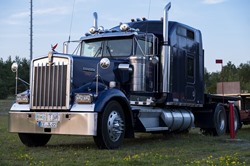How to Decide on the Right Trucker School near Millwood Kentucky
 Congrats on your decision to become a truck driver and enroll in a trucking school near Millwood KY. Perhaps it has always been your goal to hit the open road while driving a huge tractor trailer. Or possibly you have done some analysis and have found that a career as a truck driver provides good income and flexible work prospects. Regardless of what your reason is, it’s important to receive the proper training by enrolling in the right CDL school in your area. When reviewing your options, there are a number of variables that you’ll need to think about prior to making your final choice. Location will undoubtedly be important, especially if you need to commute from your Millwood residence. The expense will also be important, but selecting a school based solely on price is not the best means to guarantee you’ll obtain the right training. Just remember, your goal is to master the knowledge and skills that will enable you to pass the CDL exams and become a professional truck driver. So keeping that purpose in mind, just how do you pick a truck driving school? The answer to that question is what we are going to discuss in the remainder of this article. But first, we are going to talk a little bit about which commercial driver’s license you will ultimately need.
Congrats on your decision to become a truck driver and enroll in a trucking school near Millwood KY. Perhaps it has always been your goal to hit the open road while driving a huge tractor trailer. Or possibly you have done some analysis and have found that a career as a truck driver provides good income and flexible work prospects. Regardless of what your reason is, it’s important to receive the proper training by enrolling in the right CDL school in your area. When reviewing your options, there are a number of variables that you’ll need to think about prior to making your final choice. Location will undoubtedly be important, especially if you need to commute from your Millwood residence. The expense will also be important, but selecting a school based solely on price is not the best means to guarantee you’ll obtain the right training. Just remember, your goal is to master the knowledge and skills that will enable you to pass the CDL exams and become a professional truck driver. So keeping that purpose in mind, just how do you pick a truck driving school? The answer to that question is what we are going to discuss in the remainder of this article. But first, we are going to talk a little bit about which commercial driver’s license you will ultimately need.
Which Commercial Drivers License Will You Need?
 To operate commercial vehicles legally within the USA and Millwood KY, an operator must get a CDL (Commercial Driver’s License). The 3 license classes that a person can apply for are Class A, Class B and Class C. Given that the topic of this article is how to select a truck driver school, we will focus on Class A and Class B licenses. What differentiates each class of CDL is the type of vehicle that the driver can operate together with the GVWR (Gross Vehicle Weight Rating) or GCWR (Gross Combination Weight Rating). Following are short descriptions of the 2 classes.
To operate commercial vehicles legally within the USA and Millwood KY, an operator must get a CDL (Commercial Driver’s License). The 3 license classes that a person can apply for are Class A, Class B and Class C. Given that the topic of this article is how to select a truck driver school, we will focus on Class A and Class B licenses. What differentiates each class of CDL is the type of vehicle that the driver can operate together with the GVWR (Gross Vehicle Weight Rating) or GCWR (Gross Combination Weight Rating). Following are short descriptions of the 2 classes.
Class A CDL. A Class A Commercial Drivers License is required to drive any vehicle that has a GCWR of more than 26,000 lbs., including a towed vehicle of more than 10,000 lbs. Several of the vehicles that operators may be able to drive with Class A licenses are:
- Interstate or Intrastate Tractor Trailers
- Trucks with Double or Triple Trailers
- Tanker Trucks
- Livestock Carriers
- Class B and Class C Vehicles
Class B CDL. A Class B CDL is needed to operate single vehicles having a GVWR of more than 26,000 lbs., or a GCWR of greater than 26,000 lbs. including a towed vehicle weighing up to 10,000 lbs. Some of the vehicles that operators may be qualified to drive with Class B licenses are:
- Tractor Trailers
- Dump Trucks
- Cement Mixers
- Large Buses
- Class C Vehicles
Both Class A and Class B Commercial Drivers Licenses may also require endorsements to operate certain types of vehicles, for example passenger or school buses. And a Class A license holder, with the appropriate needed endorsements, may drive any vehicle that a Class B license holder is qualified to operate.
Click Here to Get Free Information on Truck Driving Schools Near You!
How to Research a Truck Driver School
 As soon as you have decided which Commercial Drivers License you wish to pursue, you can begin the undertaking of evaluating the Millwood KY truck driver schools that you are considering. As already mentioned, cost and location will undoubtedly be your primary considerations. But it can’t be emphasized enough that they should not be your only considerations. Other issues, for example the reputations of the schools or the experience of the instructors are equally or even more important. So following are several additional factors that you need to research while carrying out your due diligence prior to choosing, and especially paying for, your truck driver training.
As soon as you have decided which Commercial Drivers License you wish to pursue, you can begin the undertaking of evaluating the Millwood KY truck driver schools that you are considering. As already mentioned, cost and location will undoubtedly be your primary considerations. But it can’t be emphasized enough that they should not be your only considerations. Other issues, for example the reputations of the schools or the experience of the instructors are equally or even more important. So following are several additional factors that you need to research while carrying out your due diligence prior to choosing, and especially paying for, your truck driver training.
Are the Schools Accredited or Certified ? Not many truck driver schools in the Millwood KY area are accredited due to the rigorous process and cost to the schools. On the other hand, certification is more common and is provided by the Professional Truck Driver Institute (PTDI). A school is not obligated to become certified, but there are several advantages. Interested students recognize that the training will be of the highest quality, and that they will be given an ample amount of driving time. For example, PTDI mandates 44 hours of real driving time, not ride-alongs or simulations. So if a school’s program is certified (the program, not the school is certified), students know that the curriculum and training will meet the very high standards set by PTDI.
How Long in Business? One indicator to help determine the quality of a truck driving school is how long it has been in operation. A poorly rated or a fly by night school typically will not stay in business very long, so longevity is a plus. On the other hand, even the best of Millwood KY schools had to start from their opening day of training, so consider it as one of several qualifications. You can also ask what the school’s track record is regarding successful licensing and employment of its graduates. If a school won’t provide those stats, look elsewhere. The schools should also have associations with regional and national trucking companies. Having numerous contacts not only affirms a superior reputation within the trade, but also bolsters their job placement program for graduates. It also wouldn’t hurt to contact the Kentucky licensing authority to verify that the CDL trucker schools you are reviewing are in good standing.
How Effective is the Training? At a minimum, the schools should be licensed in Kentucky and hire teachers that are trained and experienced. We will discuss more about the instructors in the next segment. In addition, the student to instructor ratio should be no greater than 4 to 1. If it’s any greater, then students will not be getting the individual instruction they will need. This is especially true regarding the one-on-one instruction for behind the wheel training. And watch out for any school that professes it can train you to be a truck driver in a relatively short time frame. Learning to be an operator and to drive a tractor trailer skillfully requires time. The majority of Millwood KY schools offer training programs that range from three weeks to as long as two months, depending on the class of license or type of vehicle.
How Good are the Trainers? As earlier mentioned, it’s important that the instructors are qualified to teach driving techniques and experienced as both instructors and drivers. Although several states have minimum driving time prerequisites to qualify as a teacher, the more professional driving experience a teacher has the better. It’s also important that the instructors stay up to date with industry developments or any new regulations or changes in existing laws. Evaluating teachers might be a bit more subjective than other criteria, and possibly the ideal approach is to visit the school and talk to the teachers in person. You can also speak with a few of the students completing the training and ask if they are happy with the quality of instruction and the teacher’s qualification to train them.
Sufficient Driving Time? Above all else, an excellent truck driving school will provide ample driving time to its students. After all, isn’t that what it’s all about? Driving time is the real time spent behind the wheel driving a truck. Although the use of ride-a-longs with other students and simulators are essential training methods, they are no replacement for real driving. The more instruction that a student gets behind the wheel, the better driver she or he will be. Although driving time varies among schools, a reasonable standard is 32 hours at a minimum. If the school is PTDI certified, it will provide no less than 44 hours of driving time. Get in touch with the Millwood KY schools you are looking at and find out how much driving time they furnish.
Are they Captive or Independent ? You can get discounted or even free training from a number of truck driving schools if you enter into an agreement to drive for a specific carrier for a defined time period. This is called contract training, and the schools that offer it are called captives. So instead of maintaining affiliations with a wide range of trucking lines that they can place their graduates with, captives only work with one company. The benefit is receiving free or less expensive training by giving up the flexibility to initially be a driver wherever you choose. Clearly contract training has the potential to limit your income prospects when beginning your new career. But for some it may be the best way to get affordable training. Just remember to inquire if the Millwood KY schools you are looking at are independent or captive so that you can make an informed decision.
Provide CDL Testing Onsite? There are some states that will permit third party CDL testing onsite of trucking schools for its students. If onsite testing is permitted in Kentucky, find out if the schools you are considering are DMV certified to provide it. One advantage is that it is more accommodating than battling with graduates from competing schools for test times at Kentucky testing locations. It is also an indication that the DMV regards the authorized schools to be of a higher quality.
Are the Class Times Convenient? As previously mentioned, truck driver training is only about one to two months long. With such a short duration, it’s imperative that the Millwood KY school you choose offers flexibility for both the curriculum and the scheduling of classes. As an example, if you’re having a hard time learning a particular driving maneuver, then the teacher should be prepared to spend more time with you until you are proficient. And if you’re still working while attending training, then the class scheduling needs to be flexible enough to fit in working hours or other responsibilities.
Is Job Assistance Provided? Once you have obtained your commercial driver’s license after graduating from trucking school, you will be eager to start your new profession. Confirm that the schools you are looking at have job placement programs. Ask what their job placement rate is and what average salary their graduates start at. Also, find out which national and local trucking companies their graduates are referred to for employment. If a school has a poor job placement rate or few Millwood KY employers recruiting their grads, it might be a clue to search elsewhere.
Is Financial Assistance Available? Trucking schools are similar to colleges and other Millwood KY area vocational or trade schools when it comes to loans and other forms of financial assistance being offered. Ask if the schools you are evaluating have a financial assistance department, or at least someone who can help you understand the options and forms that need to be completed.
Top Trucking Schools Millwood Kentucky
 Choosing the appropriate truck driving school is an essential first step to starting your new occupation as a local or long distance truck driver. The skill sets taught at school will be those that mold a new career behind the wheel. There are several options offered and understanding them is critical if you are going to succeed as an operator. You originally came to our website because of your interest in Top Trucking Schools and wanting information on the topic Obtaining A CDL. However, you must receive the necessary training in order to operate a large commercial vehicle in a safe and professional fashion. If you are lacking funds or financing, you may want to think about a captive school. You will pay a reduced or in some cases no tuition by agreeing to drive for their contracted carrier. Or you can enroll in an independent trucking school and have the option of driving for the trucking firm of your choice, or one of many associated with the school. It’s your decision. But no matter how you obtain your training, you will in the near future be part of a profession that helps our country move as a professional truck driver in Millwood KY.
Choosing the appropriate truck driving school is an essential first step to starting your new occupation as a local or long distance truck driver. The skill sets taught at school will be those that mold a new career behind the wheel. There are several options offered and understanding them is critical if you are going to succeed as an operator. You originally came to our website because of your interest in Top Trucking Schools and wanting information on the topic Obtaining A CDL. However, you must receive the necessary training in order to operate a large commercial vehicle in a safe and professional fashion. If you are lacking funds or financing, you may want to think about a captive school. You will pay a reduced or in some cases no tuition by agreeing to drive for their contracted carrier. Or you can enroll in an independent trucking school and have the option of driving for the trucking firm of your choice, or one of many associated with the school. It’s your decision. But no matter how you obtain your training, you will in the near future be part of a profession that helps our country move as a professional truck driver in Millwood KY.
Truck On in These Other Kentucky Locations
Western theater of the American Revolutionary War
The Western theater of the American Revolutionary War (1775–1783) was the area of conflict west of the Appalachian Mountains, the region which became the Northwest Territory of the United States as well as the states of Kentucky, Tennessee, and Missouri. The western war was fought primarily between American Indians with their British allies in Detroit, and American settlers south and east of the Ohio River.
When the American Revolutionary War began in 1775, the Ohio River marked a tenuous border between the American colonies and the American Indians of the Ohio Country. This border had its origins in the Proclamation of 1763, which forbade British colonists from settling west of the Appalachian Mountains. The British Crown had issued the Proclamation after the French and Indian War (1754–1763) in order to prevent conflict between Indians and colonists in the vast territory newly acquired from France. Settlers and land speculators in Britain and America objected to this restriction, however, and so British officials negotiated two treaties with American Indians in 1768—the Treaty of Fort Stanwix and the Treaty of Hard Labour—which opened up land for settlement south of the Ohio River. Thereafter, tensions between British officials and colonists over western land policy diminished.[2]
Most of the Indians who actually lived and hunted in the Ohio Valley—Shawnees, Mingos, Delawares, and Wyandots—had not been consulted in the 1768 treaties. Angry with the Iroquois for selling their lands to the British, Shawnees began to organize a confederacy of western Indians with the intention of preventing the loss of their lands.[3] British and Iroquois officials worked to diplomatically isolate the Shawnees from other Indian nations, however, and so when Dunmore's War broke out in 1774, Shawnees faced the Virginia militia with few allies. After Virginia's victory in the war, the Shawnees were compelled to accept the Ohio River boundary. Shawnee and Mingo leaders who did not agree with these terms renewed the struggle soon after the American Revolutionary War began in 1775.
